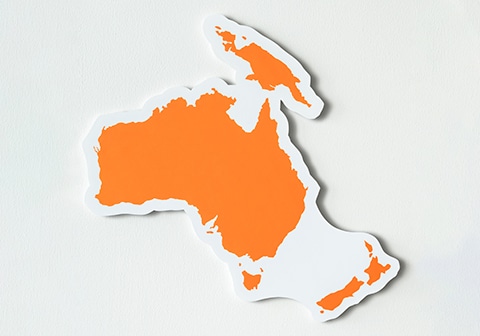If you’re thinking about moving from NZ to Australia, we’ve put together a guide to help you understand the differences in daily life between the two countries. New Zealand often looks at Australia as its trans-Tasman cousin, but there are many differences in daily life you should be aware of before you move.
1. Visas
New Zealand citizens and permanent residents automatically get granted a digital Special Category Visa (SCV), allowing you to live and work in Australia, providing you don’t have any criminal convictions or any outstanding fines. You’re able to stay in Australia with this visa for as long as you like, even if you don’t apply to become a citizen. If you aren’t a New Zealand citizen, you will need to apply for a visa.
2. Life in Australia
Australia is a much larger country than New Zealand, with different climates ranging from temperate in the south to tropical in the north, with deserts through the centre and west of the country. It also has many much larger cities than New Zealand, meaning it offers a very different lifestyle than Kiwis are familiar with. You should visit Australia first to decide where you want to live. This will save time, money and stress, especially if you’re moving your family.
As Australia is so much larger, there are big differences in each city and suburb, so it’s important to do plenty of research before you settle anywhere. It’s also important to note that the tenancy market is very competitive, so you’ll need to have all your documentation ready if you want to rent. Tenancy agreements are also a minimum of one year.
3. Education
Education differs in Australia from state to state for funding. Again, you’ll need to do your research to find the right school for your children. Schooling is not free. Even public schools charge tuition fees.
4. Healthcare
There are three funded health schemes in Australia. These are Medicare, the Pharmaceutical Benefits Scheme (PBS) and the 30% Private Health Insurance Rebate. Medicare is a publicly funded healthcare system for citizens and permanent residents. It gives you access to treatment from hospitals, doctors, midwives, nurses and other health professionals.
You will need to register with Medicare Australia after you arrive and apply in person. Take your passport for identification. You need to have lived in Australia for six months to be eligible for Medicare or to have applied for permanent residency. If you had health insurance in New Zealand, you should get it in Australia too.
5. Culture and cost of living
Australia has a diverse melting pot of different people and cultures, making it an exciting place to live. That includes a large population of New Zealanders, so friends aren’t hard to find. Wages are generally higher in Australia than New Zealand and the cost of living can be lower, except in Sydney, which is more expensive.
6. Retirement, accidents and benefits
While you can access Medicare after six months, New Zealanders aren’t entitled to receive social welfare payments, student loans, Newstart benefits (the equivalent of the unemployment benefit), parenting payments or the youth allowance. You will need to become a permanent resident to access these schemes.
You can access the Age Pension, Disability Support Pension if you’re severely disabled, and the Carer Payment if you’re the partner of a disability support pensioner.
7. Citizenship and voting
Being granted the SCV as a New Zealander is not always a direct pathway to residency or becoming an Australian citizen. You must first become a permanent resident before you can apply for citizenship. There are different conditions and criteria for eligibility, so research it further if you decide to pursue citizenship.
8. The essential trans-Tasman moving checklist
- Apply for a visa if you’re not a New Zealand citizen or permanent resident.
- Get a TFN (Australian Tax File Number) when you arrive. You can’t apply for one from New Zealand.
- Enrol with Medicare to access public healthcare.
- Open an Australian bank account.
- Transfer your money to your Australian account.
- Find temporary or permanent accommodation.
- Start looking for work.
- Find a school for your kids.
And most importantly, contact a moving company with a reputation for making trans-Tasman moves go smoothly. We have offices and depots all over Australia and New Zealand, so make sure you get a quote from us too.
